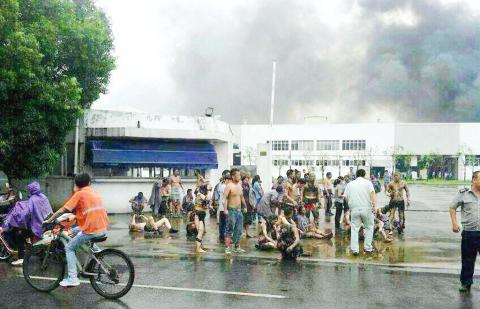An explosion killed at least 65 people and injured more than 120 at a factory in China that makes wheels for US carmakers, including General Motors Co, state media said, as the country suffered its worst industrial accident in a year.
Chinese media outlets cited the government as saying that the blast in the wealthy eastern province of Jiangsu occurred at about 7:30am yesterday in Kunshan City, after an explosion ripped through a workshop that polishes wheel hubs.
An initial investigation suggested that the blast at Kunshan Zhongrong Metal Products Co Ltd (昆山中榮金屬) was caused by negligence after a flame was lit in a dust-filled room, Xinhua news agency said.

Photo: EPA
Kunshan Zhongrong Metal Products is a company run by Taiwanese Wu Chi-tao (吳基滔), who serves as the company’s chairman, according to a report by the Chinese-language United Evening News yesterday. The company, which has US$8.8 million in registered capital, has 450 workers in China, the report said.
Two officials from Kunshan Zhongrong have been held by authorities, Xinhua reported, citing an unnamed government source.
Images online and on television showed large plumes of black smoke billowing from a white low-rise building. Many of the injured, who appeared badly burnt and in scorched clothing, were shown laying on wooden pallets and being stretchered on to trucks, public buses and ambulances.
At the workshop where the blast occurred, television reports showed images of wrecked walls and heavy machinery that had been hurled through the window.
Beijing said online that Chinese State Councilor Wang Yong (王勇) was heading to the site at the request of Chinese President Xi Jinping (習近平) and Chinese Premier Li Keqiang (李克強).
Kunshan Zhongrong could not be reached for comment.
Television reports said that there were more than 200 workers at the site when the explosion struck, and 45 died immediately.
No Taiwanese nationals were reported dead in the explosion and the cause of the incident is still under investigation, Chinese media reports said.
The Straits Exchange Foundation (SEF), Taiwan’s semi-official body for handling cross-strait exchanges, extended condolences later in the day.
SEF spokesman Ma Shaw-chang (馬紹章) said the foundation would do everything it could to help the firm.
He said that Wu was “very upset” about the incident, but has not yet asked for assistance from Taiwan.
The foundation said it has called its Chinese counterpart, the Association of Relations Across the Taiwan Straits, to express sympathy.

Seventy percent of middle and elementary schools now conduct English classes entirely in English, the Ministry of Education said, as it encourages schools nationwide to adopt this practice Minister of Education (MOE) Cheng Ying-yao (鄭英耀) is scheduled to present a report on the government’s bilingual education policy to the Legislative Yuan’s Education and Culture Committee today. The report would outline strategies aimed at expanding access to education, reducing regional disparities and improving talent cultivation. Implementation of bilingual education policies has varied across local governments, occasionally drawing public criticism. For example, some schools have required teachers of non-English subjects to pass English proficiency

‘FORM OF PROTEST’: The German Institute Taipei said it was ‘shocked’ to see Nazi symbolism used in connection with political aims as it condemned the incident Sung Chien-liang (宋建樑), who led efforts to recall Democratic Progressive Party (DPP) Legislator Lee Kun-cheng (李坤城), was released on bail of NT$80,000 yesterday amid an outcry over a Nazi armband he wore to questioning the night before. Sung arrived at the New Taipei City District Prosecutors’ Office for questioning in a recall petition forgery case on Tuesday night wearing a red armband bearing a swastika, carrying a copy of Adolf Hitler’s Mein Kampf and giving a Nazi salute. Sung left the building at 1:15am without the armband and apparently covering the book with a coat. This is a serious international scandal and Chinese

TRADE: The premier pledged safeguards on ‘Made in Taiwan’ labeling, anti-dumping measures and stricter export controls to strengthen its position in trade talks Products labeled “made in Taiwan” must be genuinely made in Taiwan, Premier Cho Jung-tai (卓榮泰) said yesterday, vowing to enforce strict safeguards against “origin laundering” and initiate anti-dumping investigations to prevent China dumping its products in Taiwan. Cho made the remarks in a discussion session with representatives from industries in Kaohsiung. In response to the US government’s recent announcement of “reciprocal” tariffs on its trading partners, President William Lai (賴清德) and Cho last week began a series of consultations with industry leaders nationwide to gather feedback and address concerns. Taiwanese and US officials held a videoconference on Friday evening to discuss the

PERSONAL DATA: The implicated KMT members allegedly compiled their petitions by copying names from party lists without the consent of the people concerned Judicial authorities searched six locations yesterday and questioned six people, including one elderly Chinese Nationalist Party (KMT) member and five KMT Youth League associates, about alleged signature forgery and fraud relating to their recall efforts against two Democratic Progressive Party (DPP) legislators. After launching a probe into alleged signature forgery and related fraud in the KMT’s recall effort, prosecutors received a number of complaints, including about one petition that had 1,748 signatures of voters whose family members said they had already passed away, and also voters who said they did not approve the use of their name, Taipei Deputy Chief Prosecutor